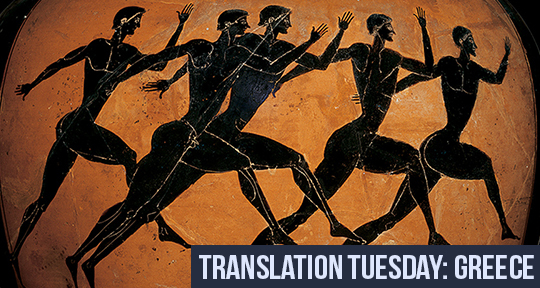For this week’s Translation Tuesday we present two newly translated poems from one of the most influential figures in modern Greek poetry, Constantine Cavafy (1863–1933). Though known primarily through English translations of his work (championed by Anglophone writers such as E.M. Forster), Cavafy has enjoyed increased attention as a formal innovator of Greek poetics. Born in Alexandria, Egypt, to Greek parents, and later educated in Britain, Cavafy would spend the bulk of his life in Alexandria writing poems for private circulation among friends, family, and local periodicals, eschewing the trappings of potential literary fame. Around the turn of the twentieth century, the poetry community of mainland Greece eventually embraced Cavafy’s bold new poetics, launching a modernist revival of Greek verse. Scholar and translator Alex de Voogt shares some of his insights on Cavafy’s formal stylings:
Cavafy built on the traditional Dekapentasyllavo or Greek folk song but allowed a flexible number of syllables, six or seven for either hemistich, together with a clear caesura. In later years, Cavafy would break the integrity of the meaningful phrase in each hemistich but never violated his own rules of syllabics . . . Syllabics look, feel and sound different when they are applied in translation. They are a hidden structure with historical antecedents. Cavafy used his hemistiches for an increasingly complex enjambment across line breaks as well as across the caesura.
“In the month of Athyr”
I am struggling to read an Ancient stone inscription
that says “Lo[r]d Jesus Christ.” A “So[u]l” may be distinguished.
“In the month of Athyr” “Lefkio[s] w[ent] to rest”
With reference to his age “He lived this many years”
the Kappa Zeta shows he was laid to rest still young.
I see in the corrupted text “Hi[m] . . . Alexandrian”
And then there are three lines especially disfigured
but some words can be made out such as “our t[ea]rs,” “suffering”
then once again the “tears” and “his [f]riends are mourning [h]im”
It seems that Lefkios must have been greatly loved.
In the month of Athyr Lefkios was laid to rest.
*
“Artisan of kraters”
On this bowl for mixing wine crafted from purest silver
designed for Heraklidis his place of residence
a place where elegance so much predominates
note the stylish flowers as well as streams and thyme.
In its center, I set one beautiful young man
naked and erotic; with just one of his legs
dangling in the water— O memory, I pleaded
for you to assist me to recreate the image
of the one whom I loved the young face as it was.
With great difficulty I achieved this, because
just about fifteen years have gone by since the day
he fell as a soldier there at Magnesia.
Translated from the Greek by Alex de Voogt
The Greek poet Constantine P. Cavafy (1863–1933) lived most of his life in Alexandria, Egypt. He is regarded as one of the most influential and original Greek poets of the twentieth century. His poems have homoerotic, philosophical, and political themes, often set in (late) antiquity and written with a great aesthetic perfectionism and near absence of metaphor.
Alex de Voogt is an associate professor at Drew University and a candidate in their poetry-in-translation MFA program. He was trained as a linguist and translates poetry from a variety of languages to English and Dutch. At present, he has taken a particular interest in Constantine Cavafy’s innovations in poetic form.
*****
Read more on the Asymptote blog:

